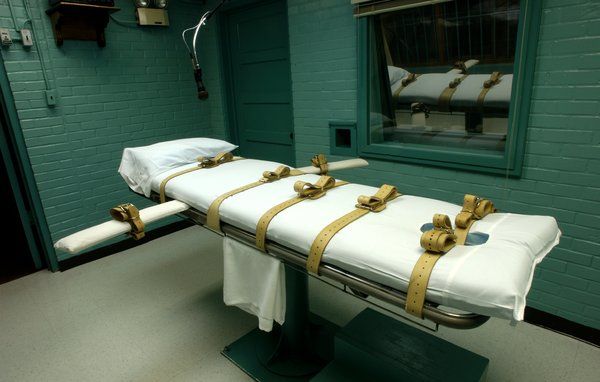A Catalog of Last Rants, Pleas and Apologies From America’s Busiest Death Chamber
Karl Eugene Chamberlain went to his neighbor’s apartment that night in Dallas under the pretense of borrowing sugar. He returned later, forced her into a bedroom, bound her hands and feet, raped her and then used a rifle to shoot and kill her. His victim, Felecia Prechtl, 29, was a single mother with a 5-year-old son.
 Eleven years after he was convicted of capital murder, Mr. Chamberlain, 37, was strapped to a gurney in Texas’ execution chamber at the Walls Unit prison here and was asked by a warden if he had any last words. “Thank you for being here today to honor Felecia Prechtl, whom I didn’t even know,” he told her son, parents and brother on June 11, 2008. “I am so terribly sorry. I wish I could die more than once to tell you how sorry I am.”
Eleven years after he was convicted of capital murder, Mr. Chamberlain, 37, was strapped to a gurney in Texas’ execution chamber at the Walls Unit prison here and was asked by a warden if he had any last words. “Thank you for being here today to honor Felecia Prechtl, whom I didn’t even know,” he told her son, parents and brother on June 11, 2008. “I am so terribly sorry. I wish I could die more than once to tell you how sorry I am.”His words did not die with him. Texas wrote them down, kept them and posted them on the Internet.
The state with the busiest death chamber in America publishes the final statements of the inmates it has executed on a prison agency Web site, a kind of public catalog of the rantings, apologies, prayers, claims of innocence and confessions of hundreds of men and women in the minutes before their deaths.
Charles Nealy asked to be buried not to the left of his father but to the right of his mother. Domingo Cantu Jr., who dragged a 94-year-old widow across the top of a chain-link fence, sexually assaulted her and then killed her, told his wife that he loved her and would be waiting for her on the other side.
The condemned praised Allah and Jesus and Sant Ajaib Singh Ji, a Sikh master. Three cheered for their favorite sports teams, including Jesse Hernandez, whose execution last year made headlines after he shouted, “Go Cowboys!” They spoke in English, Spanish, French, Vietnamese, Gaelic, German (“Meine schöne prinzessin,” said Mr. Cantu, German for “my beautiful princess”). They quoted the Koran and the Bible, but also Todd Beamer’s phrase aboard United Airlines Flight 93.
“Sir, in honor of a true American hero, ‘Let’s roll,’ ” said David Ray Harris, who was dishonorably discharged from the Army and was executed in 2004 for killing a man who tried to stop him from kidnapping the man’s girlfriend.
The execution on Wednesday of Kimberly McCarthy — a 52-year-old woman convicted of robbing, beating and fatally stabbing a retired psychology professor near Dallas — was the 500th in Texas since December 1982, when the state resumed capital punishment after the Supreme Court reinstated the death penalty in 1976. In those 30 years, Texas has executed more people than Alabama, Florida, Georgia, Missouri, Oklahoma and Virginia combined.
The state’s execution record has often been criticized as a dehumanizing pursuit of eye-for-an-eye justice. But three decades of last statements by inmates reveal a glimmer of the humanity behind those anonymous numbers, as the indifferent bureaucracy of state-sanctioned death pauses for one sad, intimate and often angry moment.
“I hope that one day we can look back on the evil that we’re doing right now like the witches we burned at the stake,” said Thomas A. Barefoot, who was convicted of murdering a police officer and was executed on Oct. 30, 1984.
Among the death-penalty states, Texas and California are the only ones that make the last words of offenders available on their Web sites. But only Texas has compiled and listed each statement in what amounts to an online archive. The collection of 500 statements, which includes inmates’ verbal as well as written remarks, has been the subject of analysis, criticism and debate by lawyers, criminal justice researchers and activists who oppose the death penalty.
It has spawned at least one blog, Lost Words in the Chamber, which has regularly posted the last statements since 2011. Officials with the prison agency, the Texas Department of Criminal Justice, said there were three million page views of inmates’ final words last year.
“It’s kind of mesmerizing to read through these,” said Robert Perkinson, the author of “Texas Tough: The Rise of America’s Prison Empire” and a professor at the University of Hawaii at Manoa. “Most people about to be executed haven’t had a lot of success in school or life. They’re not always so skilled at articulating themselves. There are plenty of clichés, sometimes peculiar ones, like the Cowboys reference. But I think many of these individuals are also striving to say something poignant, worthy of the existential occasion.”
Source: NY Times




